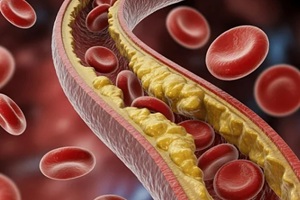 It takes more than just looking at your cholesterol numbers to figure out when you need cholesterol medication. Your doctor will take a look at all aspects of your health, including age, medical history, and other variables that might affect your risk of developing heart disease. Many people can keep their cholesterol under control by simply changing their diet and exercising more.
It takes more than just looking at your cholesterol numbers to figure out when you need cholesterol medication. Your doctor will take a look at all aspects of your health, including age, medical history, and other variables that might affect your risk of developing heart disease. Many people can keep their cholesterol under control by simply changing their diet and exercising more.
However, others may need to add medication to their regimen to protect their cardiovascular health.
How Your Doctor Decides About Medication
Your healthcare provider weighs several factors before prescribing cholesterol medication. They start by looking at your cholesterol levels, but they don’t stop there. Your age, family history, smoking status, blood pressure, and whether you’ve had heart problems or diabetes before all play a role in this decision.
Doctors employ specialized evaluation tools that calculate your chances of experiencing a heart attack or stroke in the next 10 to 30 years.
These calculators take into account your cholesterol levels, current health conditions, lifestyle habits, and other factors that affect your cardiovascular risk. This thorough approach helps your provider determine if medication is suitable for your situation.
The Cholesterol Numbers That Matter
Your total cholesterol should stay below 200 mg/dL. However, your LDL cholesterol number often matters more when deciding about medication. LDL is the type of cholesterol that accumulates in your arteries and elevates your risk of heart attacks and strokes.
Most people should aim to keep their LDL below 100 mg/dL. If you’ve already had a heart attack or face very high cardiovascular risk, your provider may want your LDL even lower, below 70 mg/dL. When your LDL reaches 190 mg/dL or higher, medication usually becomes necessary regardless of other factors.
Who Typically Needs Cholesterol Medication
Healthcare providers follow specific guidelines when prescribing cholesterol medication. You likely need medication if you fall into one of these groups:
You’ve already suffered from a heart attack, stroke, or you have blocked arteries in your legs or neck: Past cardiovascular events mean medication can help prevent future problems, even if your cholesterol numbers look reasonable.
Your LDL cholesterol measures 190 mg/dL or higher: At this level, you probably have a genetic condition that causes extremely high cholesterol, putting you at significant risk for heart attacks and strokes.
 You’re between 40 and 75 years old with diabetes and an LDL between 70 and 189 mg/dL: Diabetes increases your cardiovascular risk substantially, especially when combined with elevated cholesterol.
You’re between 40 and 75 years old with diabetes and an LDL between 70 and 189 mg/dL: Diabetes increases your cardiovascular risk substantially, especially when combined with elevated cholesterol.
You’re 40 to 75 years old with risk factors such as high blood pressure, diabetes, or smoking, and your 10-year heart attack risk is 10% or higher: This combination of factors makes medication beneficial for protecting your heart.
Why Lifestyle Changes Don’t Always Work Alone
Healthy eating, regular exercise, maintaining a proper weight, and not smoking all help lower cholesterol. These changes work well for some individuals and can reduce medication needs or even eliminate the need for medication altogether.
However, your genetics and age also influence your cholesterol levels significantly. Some people inherit genes that cause their bodies to produce excessive cholesterol or prevent the proper processing of cholesterol. For these individuals, lifestyle changes can be helpful but may not lower cholesterol to safe levels.
Your body naturally produces more cholesterol as you age, which can override even the healthiest lifestyle habits. When genetics or age work against you, medication fills the gap that lifestyle changes can’t bridge.
Understanding Your Additional Risk Factors
In addition to cholesterol numbers, several other factors might also increase your heart disease risk. For example, high blood pressure means that your heart is forced to work harder, leading to damage to artery walls. Smoking injures your blood vessels and reduces oxygen in your blood. Excess weight strains your cardiovascular system and often introduces other health issues.
Family history matters considerably. If any of your male relatives developed heart disease before age 55 or female relatives before age 65, you carry a higher risk yourself. Previous heart attacks, strokes, or narrowed arteries in your neck, arms, or legs indicate existing cardiovascular disease that requires aggressive treatment.
Your healthcare provider adds up all these factors to determine your overall risk profile. The more risk factors you have, the more likely you’ll benefit from cholesterol medication, even if your cholesterol numbers sit just slightly above ideal levels.
What Happens After Starting Medication
Cholesterol medication typically becomes a long-term commitment. If medication successfully lowers your cholesterol, stopping it usually causes your levels to rise again. Your body continues to produce cholesterol at the same rate as before treatment, so ongoing medication remains necessary to maintain healthy levels.
You’ll still need to maintain healthy lifestyle habits while taking medication. Eating well, exercising regularly, managing your weight, and avoiding tobacco all work together with medication to provide maximum cardiovascular protection.
Some people wonder whether significant weight loss or major dietary improvements might allow them to stop taking medication. If you make substantial lifestyle changes, discuss with your provider whether continuing medication remains necessary. However, most people need to stay on their prescribed treatment indefinitely.
Imperial Center Family Medicine Manages Your Cholesterol Health
 Imperial Center Family Medicine provides complete cholesterol management services, including regular monitoring, risk assessment, medication management, and personalized lifestyle guidance to protect your cardiovascular health.
Imperial Center Family Medicine provides complete cholesterol management services, including regular monitoring, risk assessment, medication management, and personalized lifestyle guidance to protect your cardiovascular health.
Our experienced providers work with you to determine the right treatment approach for your individual situation and help you maintain healthy cholesterol levels for years to come. Contact us today at 919-873-4437 or online to schedule your cholesterol evaluation and take control of your heart health.
